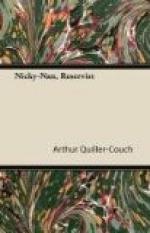“And if you’ll believe me,” reported Mr Latter to a wondering audience that evening, “the man pulled out of his pocket—his right pocket, this time—a two-shillin’ piece and a penny; and as he picks out the two-shillin’ piece, to pay me, what happens but he lets drop another sovereign, that had got caught between the two! It pitched under the flap o’ the counter an’ rolled right to my boot! ’What did I say to en?’ Well, I don’t mind ownin’ that for a moment it took me full aback an’ tied the string o’ my tongue. But as I picked it up and handed it to en, I says, says I, ‘Mr Nanjivell,’ I says, ’at this rate I don’t wonder your not joinin’-up wi’ the Reserve.’ . . . What’s more, naybours, I don’t mind admittin’ to you that after the man had paid an’ left, I slipped to the door an’ keeked out after him—an’ that story of his about it bein’ his rent-money was all a flam. He went past Pamphlett’s Bank, never so much as turnin’ to look at it.”
CHAPTER XII.
FIRST ATTEMPT AT HIDING.
Nicky-Nan belonged, congenitally and unconsciously, to that happy brotherhood of men—felices sua si bona norint—whom a little liquor exhilarates, but even a great deal has no power to bemuse. But what avails an immunity above your fellows, if life seldom or never gives you opportunity to prove it?
Nicky-Nan had drunk, after long abstinence and upon a fasting stomach, one brandy-and-soda. He was sober as a judge; he walked straight and—bating his weak leg—firmly, yet he trod on air: he looked neither to the right nor to the left, yet he saw nothing of the familiar street through which he steered. For a vision danced ahead of him. Gold in his pockets, golden sunshine now in his veins—thanks to the brandy-and-soda,—a golden vision weaving itself and flickering in the golden August weather, and in his ears a sentence running, chiming, striking upon the word “gold”— “Ding-a-ding-a-dong! ’Taty-patch a gold mine—’taty-patch a gold mine!” The prosaic Mr Latter had set the chime ringing, as a dull sacristan might unloose the music of a belfry; but like a chime of faery it rippled and trilled, closing ever upon the deep note “gold,” and echoed back as from a veritable gong of that metal.
“’Taty-patch a gold mine”—How came it that, until Latter put the idea into his head, he had never thought of this, his one firm holding on earth, as a hiding-place for his treasure? His lodging in the old house, hard as he would fight for it, acknowledged another man’s will. But the patch of ground by the cliff was his own. He had claimed its virginity, chosen and tamed it, marked it off, fenced it about, broken the soil, trenched it, wrought it, taught the barren to bear. It lay remote, approachable only by a narrow cliff-track, overlooked by no human dwelling, doubly concealed—by a small twist of the coast-line and a dip of the ground—from




